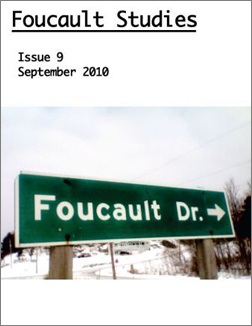Foucault, Borges, Heterotopia: Producing Knowledge in Other Spaces
DOI:
https://doi.org/10.22439/fs.v0i9.3059Abstract
Arguably the most famous heterotopia that appears in Foucault’s work is the Chinese encyclopedia, which originates in the fiction of Jorge Luis Borges. Drawing on this citation of Borges, this article examines Foucault’s notion of the heterotopia as it relates to order and knowledge production. Frequently, heterotopias are understood as sites of resistance. This article argues that shifting the focus from resistance to order and knowledge production reveals how heterotopias make the spatiality of order legible. By juxtaposing and combining many spaces in one site, heterotopias problematize received knowledge by destabilizing the ground on which knowledge is built. Yet heterotopias always remain connected to the dominant order; thus as heterotopias clash with dominant orders, they simultaneously produce new ways of knowing. This article first explores the tensions between Foucault’s two definitions of heterotopias before connecting these definitions to Foucault’s distinctly spatial understanding of knowledge as emerging from a clash of forces. Finally, the paper ends by returning to the relationship between Foucault, Borges, and heterotopias.Downloads
Veröffentlicht
2010-09-01
Zitationsvorschlag
Topinka, R. J. (2010). Foucault, Borges, Heterotopia: Producing Knowledge in Other Spaces. Foucault Studies, (9), 54–70. https://doi.org/10.22439/fs.v0i9.3059
Ausgabe
Rubrik
Articles
Lizenz
Authors retain copyright to their work, but assign the right of the first publication to Foucault Studies. The work is subject to a CC BY-NC-ND 4.0 license, but despite these restrictions, authors can take for granted that Foucault Studies will permit articles published in Foucault Studies to be translated or reprinted in another format such as a book providing a full reference is made to Foucault Studies as the original place of publication.



